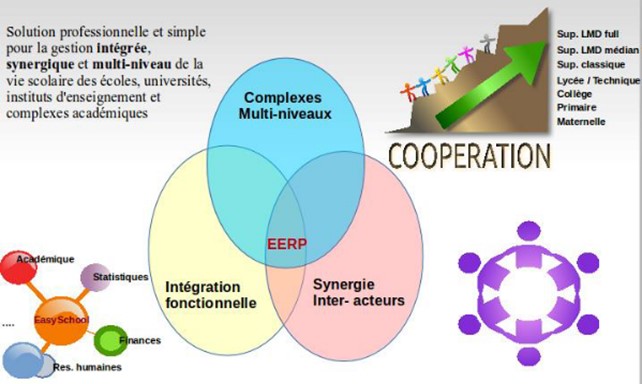Disclaimer:
Please be aware that the content herein has not been peer reviewed. It consists of personal reflections, insights, and learnings of the contributor(s). It may not be exhaustive, nor does it aim to be authoritative knowledge.
DESCRIPTION DE LA SOLUTION : EasySchool est une solution logicielle professionnelle et simple pour la gestion intégrée, synergique et multi-niveau de la vie académique des écoles, universités, instituts d'enseignement et complexes académiques. La solution « EasySchool » a été conçue progressivement pour répondre aux besoins de gestion optimisée des acteurs essentiels du système éducatif à la fois, en l'occurrence les structures en charge de l’enseignement, les enseignants, les parents, les étudiants et l’administration publique. EasySchool adresse des problématiques parfois complexes sur un périmètre vertical allant du niveau de la maternelle à celui du supérieur, sur un périmètre horizontal de l'intégration fonctionnelle de l'académique, des finances et statistiques entre autres et sur un périmètre circulaire de synergie entre les acteurs essentiels de l'éducation à travers l'internet, les communications mails et des SMS « intelligents ». Le système innovant développé à travers EasySchool est de promouvoir une éducation pour tous qui s’appuie sur des outils qui ne nécessite pas dans tous les cas l’internet pour : Restaurer l’éducation mise en mal dans les zones affectées par l’insécurité due au terrorisme, avec un niveau de qualité très raisonnable ; Permettre l’accès à l’éducation dans des zones difficiles d’accès ou isolées et à des populations nomades ; Permettre la continuité de l’éducation avec l’avènement de la Covid-19, qui a occasionné la fermeture prématurée et généralisée des écoles.
Le caractère innovant de EasySchool, s’identifie à travers les atouts suivants : Une grande accessibilité qui s’appuie sur le télé-enseignement avec en sus la possibilité d’avoir du contenu pédagogique sur des appareils mobiles tels que les tablettes solaires et les téléphones intelligents (Smartphones) ; Dans les zones sans internet, EasySchool peut fonctionner hors connexion ; C’est un système qui permet l’interactivité entre les acteurs éducatifs que sont les enseignants, les gestionnaires de l’enseignement, les parents, les élèves et les étudiants. à travers un système de communication SMS ; EasySchoool permet l’évaluation formelle et à distance avec un protocole de communication SMS propulsé par la plateforme EasySchool ; Il existe une facilité de communication automatique des comptes rendus périodiques par SMS sur l’apprentissage de l’élève aux parents ; Le système génère des bulletins trimestriels et annuels pour les élèves et offre une meilleure prise de décision pour le passage ou non à un niveau supérieur.
PROMOTEUR : EquoService ([REDACTED] et [REDACTED]
PROBLEME ADRESSE : Easy school : LeSystème éducatif des pays en voie de développement fait face à de nombreuxdéfis qui limitent sa performance et les opportunités d'innovation. Parmi ces défis, il y a la problématique de l’accès à une éducation de qualité au profit de tous les apprenants dans un contexte marqué par l’insécurité liée au terrorisme et par la pandémie du Covid-19. Au Burkina Faso, des milliers d’élèves sont mis sur le banc de touche du système éducatif classique. En raison de l’insécurité ambiante, on estime que plus de 256 000 enfants n’ont pas pu aller à l’école au cours de l’année scolaire 2019-2020. C’est une réalité vécue par plusieurs enfants dans plusieurs zones où la crise sécuritaire amène plusieurs enfants à être hors du système éducatif. Aussi, avec l’avènement du Covid-19 et dont les premiers cas ont été révélés au Burkina Faso en Mars 2020, les premières mesures prises par les autorités ont été la fermeture de toutes les écoles du pays. La pandémie du coronavirus aggrave ainsi la situation difficile créée par l’insécurité dans certaines zones du pays, avec la fermeture des établissements d’enseignement et de formation professionnelle (pré scolaire, primaire, secondaire, supérieur, écoles etc.) dans tout le pays. La problématique de l’accessibilité à l’éducation et à la formation, qui étaient circonstancielle et localisée, s’est généralisée et touche tout le pays. On assiste alors à un arrêt total des activités d’enseignement et de formation.
Impact : Contribuer à l’accès d’une éducation de qualité au profit de tous les apprenants dans un contexte marqué par l’insécurité liée au terrorisme et par la pandémie du Covid-19.


 4Quality education
4Quality education 9Industry, innovation and infrastructure
9Industry, innovation and infrastructure 10Reduced inequalities
10Reduced inequalities
Comments
Log in to add a comment or reply.